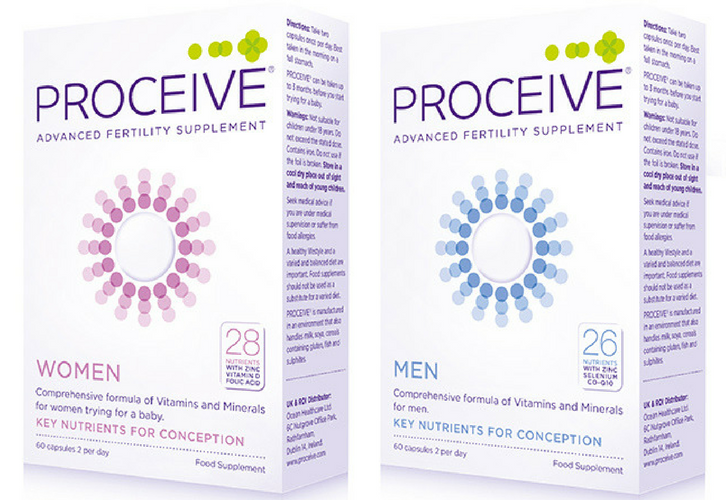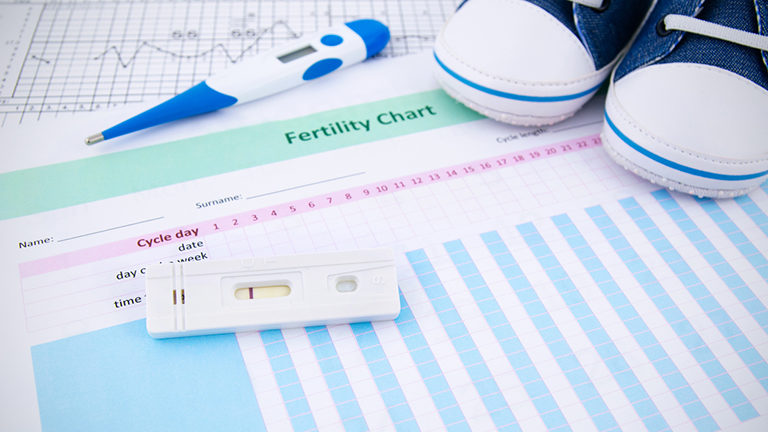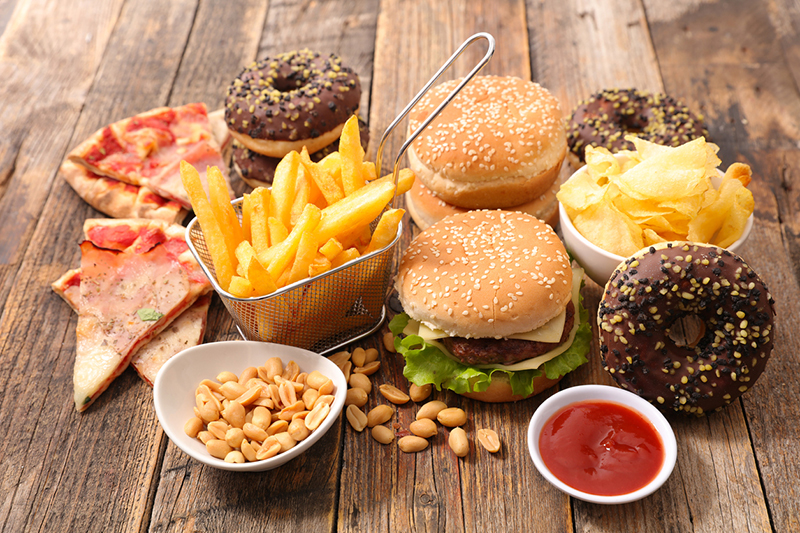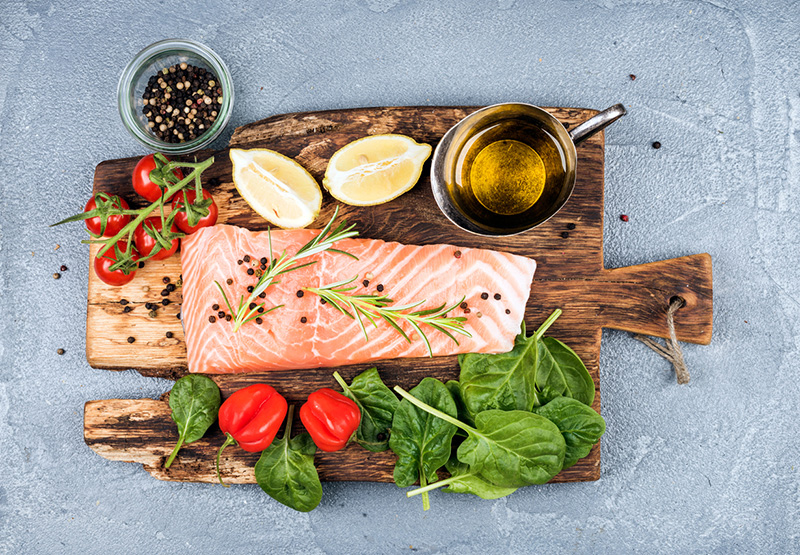Here’s a biological fact: age is the biggest factor influencing your fertility, but your diet and lifestyle also play a key role, especially if you’re over 30. We’ve talked to leading experts to find out what can help you increase your fertility.
If you talk to medics about female fertility most will cite facts about a woman’s declining fertility after she hits 30.
‘The best way to future-proof your fertility is to have your children in your 20s and early 30s, and accept you may not conceive if you leave it until later,’ says Dr Phil Boyle, a consultant in reproductive medicine at Neo Fertility, Dublin. ‘Just know that and decide where life’s priorities lie for you and make an informed decision. The single biggest factor to predict ability to conceive is female age.’
So far, so scary.
But while most recent figures in 2016 from the Office of National Statistics reports that the average age women have their first baby in Britain is 28.8 and a heartening 54 percent of babies born in Britain were to women who were 30 or older. Stated in another report is that almost a quarter of children in 2016 were born to mothers aged 35 and up.
So, while we can’t escape or reverse our biological clocks, experts also agree that there are certain lifestyle and diet measures you can take to help your fertility ‘fitness’ to increase your chances of conception when you are ready.
‘Remaining fit and healthy, not smoking or taking illicit drugs, having only modest alcohol and caffeine, regular sexual health check ups to reduce the risk of sexually transmitted infections (STIs) and minimal stress will all help, but age is still key,’ says Dr Boyle.
What about his fertility?
‘There are many misconceptions around male fertility, namely, that men tend to think they will be able to conceive forever,’ says Dr Boyle. ‘But after the age of 40, the quality of men’s sperm declines and older men trying for a baby may experience low sperm count, poor mobility and damage to DNA. It’s important for men to understand the importance of having good quality sperm for a healthy pregnancy and lifestyle affects this.’
With that in mind, Healthista quizzed the experts on the specific things as you can do to help maintain your fertility.
1. Keep trying (yes, we mean having sex)
When thinking about having a baby, many of us think it should happen the minute we start trying. While one in four couples aged 28 and up experience difficulties when trying to conceive, evidence suggests if they keep trying it will get better. ‘On average, half of couples who have not conceived in 12 months will conceive in the next 12 months,’ says Dr Boyle. ‘That’s higher than what most fertility clinics achieve. So, it might be advisable to wait two years before considering fertility treatment.’
You can get ovulation predictor kits from pharmacies that analyse levels of luteinising hormone (LH) and tell you when you’re most likely to ovulate, says pharmacist Laura Dowling. ‘These can be really useful for women with irregular cycles to know when is the right time to have sex.’ Still, it’s not really advisable (or very sexy) to only stick to times when you’re ovulating to have sex. ‘Have sex every two to three days throughout your cycle for the best chances of getting pregnant,’ says Dowling.
2. Get the checks you need
Your body’s fertility potential is influenced by biological factors only your doctor can test for. Abnormal bleeding, poor quality cervical mucus, irregular cycles, blocked fallopian tubes and painful periods might all influence your fertility both short and long-term, Dr Boyle says. Talk to your GP to ensure that you don’t need treatment.
3. Avoid those junk fats
If you’re still eating processed foods full of junk fats, stop. If not for your waistline, then for the sake of your long-term fertility. ‘Male and female hormones are made up of fat. Cell membranes are made up of fats consumed through diet,’ says Gaye Godkin, nutritionist. ‘If we consume too many trans-fats, found in margarine, donuts, cakes, biscuits as well as some pizza and chips, they may interfere with the delicate signalling that occurs on these membranes.’
4. Avoid (too much) alcohol
Sorry. ‘Possibly the biggest anti-nutrient consumed is alcohol,’ says Godkin. ‘It’s detrimental to both sperm health and female eggs, and in excess can create havoc on the very delicate female hormone system.’ Male sperm is particularly affected by the amount of alcohol consumed, she explains. ‘This is because alcohol disrupts blood glucose levels and excess circulating glucose both damages sperm cells and destroys a vital B vitamin called folate(see below).’
5. AND too much coffee
Doesn’t sound like much fun does it, but there are very real reasons why too much caffeine has been shown to lower your chances of getting pregnant. ‘Whilst you might find a cup of coffee comforting, drinking excess caffeine can increase the production of the stress hormone adrenaline,’ says Godkin. ‘High levels of circulating adrenaline can interfere with the intrauterine environment, egg quality and male sperm production, and also depletes the body of many essential nutrients such as vitamin C, B and magnesium. Women in particular tend to be more sensitive to caffeine and caffeinated products. Drinking caffeine and sugar laden caffeinated drinks may further increase their production of adrenaline. If trying to conceive it is best to avoid or reduce your coffee consumption to one weak coffee a day and to eliminate caffeinated sugary drinks from your diet.’
6. Get your baby-making nutrients
When you’re trying to conceive or if you’re trying to prolong your fertility until you’re ready getting the right vitamins and nutrients is essential. ‘Nutrition is essential for conception,’ says Dr Boyle. ‘Zinc, selenium, folic acid, B vitamins, vitamin D, omega-3 fish oils and antioxidants are all important.’
Vitamins and minerals play a crucial role in the body during conception and preconception, says Godkin. ‘For example, B6 contributes to the regulation of hormonal activity while folic acid contributes to normal maternal tissue growth during pregnancy.
‘For men, diet and nutrients are a key way to influence sperm quality,’ Godkin continues. ‘Choose foods high in antioxidants especially brightly coloured fruit and vegetables which are packed full of antioxidants – beetroot, berries, orange and red vegetables are particularly good.’ for men, selenium contributes to the normal creation of sperm, Godkin asserts, and the best sources are Brazil nuts, fish and potatoes fortified with selenium.
7. You especially want Zinc
‘Zinc contributes to normal fertility and reproduction,’ Says Godkin. ‘Men need to produce between 40 and 300 milllion sperm cells to be fertile. Increasing zinc levels in men has been shown to improve the structure and function of male sperm, enhancing the mobility, motility and strength needed to make the long journey through the female for fertilisation to take place.’
For women, zinc is also an essential fertility nutrient. But while it’s abundant in fish and in particular lamb, beef, shellfish and oysters as well as pumpkin seeds, nuts and meat, it can be in short supply in the modern diet if you consume a lot of processed foods. ‘Exposure to stress, pollution and cigarette smoke can also deplete our bodies of essential zinc supplies,’ says Godkin. ‘Overheating food can also deplete its nutritional content.’
8. And iron
Red blood cells deliver oxygen to the cells of the body which includes the ovaries. If they receive insufficient oxygen and iron the eggs can become less viable, says Godkin. In fact, studies have shown that lack of iron can cause anovulation, which is when a woman doesn’t ovulate as her egg may be in poor health. ‘Rich food sources of iron include, lambs liver, red meat, fish,’ says Godkin. ‘Vegetarians and vegans may need to keep a constant check on their iron levels to support conception.’
9. The RIGHT fats
Okay, so you’re avoiding the bad fats, but you absolutely have to get good fats into you, namely, those rich in omega-3 fatty acids. ‘Omega-3 is an essential fat,’ says Godkin. ‘The body can’t make its own omega-3 fats, so it needs to get them from your diet. Omega-3s are found in oily fish such as mackerel, sardines, anchovies, salmon and trout. However, it’s advisable to avoid tuna in the preconception period and during the pregnancy as it contains high levels of mercury.’
10. Don’t forget about folate
‘For women it is particularly important to have the right amount of folate in your body before trying for a baby. The recommendation is three months before conception — the length of time needed to achieve the necessary level in the body,’ says Godkin. ‘Green leafy vegetables contain high levels of folate but as vegetables, nutrients can be lost through cooking which is why supplementation is necessary.’
11. Get serious about a fertility-fit lifestyle if you’re over 35
Here’s the biology. Women are born with a set number of eggs in the ovaries. Over the years the quantity and quality of the eggs will deplete. While we cannot do anything about the amount of eggs remaining in our ovaries, we can support the development of those egg follicles as they mature. ‘An immature egg takes three to four months to mature before finally being released during ovulation,’ says Godkin. ‘The environment that this egg is immersed in influences the health and quality of the egg.’ Changes to diet and lifestyle during this time frame may make a difference to the health and quality of the egg follicles giving you a higher chance of conception. Improving diet and nutrient intake is also paramount to enhancing the circulation of nutrient-rich blood to the ovaries to support egg quality.’
12. Take a fertility supplement three months before you start trying
Dr Boyle suggests women should be looking for a supplement with B vitamins, magnesium,
and folic acid, whilst men should ensure they are boosting the quality of their sperm with zinc, selenium and arginine.

Read More
Is sugar ruining your fertility?
5 fertility mistakes your MAN is probably making
7 sex tips to help you get pregnant
How to eat during pregnancy – an expert’s guide
Pilates for pregnancy to keep you active in your first trimester
Like this article? Sign up to our newsletter to get more articles like this delivered straight to your inbox.






















































